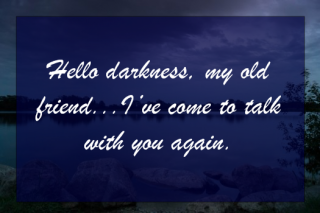I have recently come face-to-face with a fact about myself: I have a problem with silence. I’m not really sure why.
It’s a strange fact, because previous seasons of my life has been dominated by my search for silence. But now I find that what I sought so desperately I go to equal lengths to avoid. So much so it’s just begun to affect my life and not so great ways.

There are so many things I need silence for. Thinking. Writing. Sorting out my feelings. But perhaps therein lies the resistance to it. Many of these things have become, sadly, a bit painful for me. Thinking often leads me to worry and rumination. Writing has become painfully raw in many cases. And sorting out my feelings requires my facing pain I really don’t want to face.
As I wrote some months ago, in November I lost a really good friend. She died on a Friday. By Sunday the rumination had already begun. I found myself lying awake in the middle of the night replaying the last days of her life. Wondering what, if anything I might have done differently to change the outcome of her last days. By the time daylight broke, I realized that I needed to do something to keep the rumination at bay.
Monday I went to work. Some of my coworkers were surprised to see me there. Given the depth of our relationship and the traumatic way her last evening impressed upon me, they wondered why I would subject myself to the workplace. I was even encouraged by leadership to go home. But they didn’t know. I was avoiding silence.

While I had no illusions about my ability to be even halfway functional in the emotional state I was in, I knew that silence would only make it worse. It seems all too easy for my brain to go into the dark places and play those movies in ways that shatter the soul. I needed the focus on others and personal connection, even if superficial, to keep me from those dark places.
But now I find myself questioning how far this should go. When does avoiding the silence transition from a protective measure to an escapist one? That’s a hard question to ponder, but one I’m doing at the moment. I have decided, as a spiritual measure, to try to incorporate more silence into my life.
The challenge that comes along with that is to figure out how to keep that silence from becoming toxic. To direct my mind to places that are productive rather than destructive. It’s something I know that I can do, as I’ve done it before. In my teenage years silence was one of the few tools that kept me functional during a chaotic time. I learned to channel it with prayer, meditation, and disciplines like yoga.
That’s what worked for me then, but is it what will work for me now? That’s what I have to find out. It’s necessary, because without silence, I feel stuck. It has affected nearly every part of my life. Without silence, I find it difficult to sleep. But I find it difficult without it is well. Clearly, this is pointing to something. Something that needs to be handled.
I wish I could say that this is only a short term thing, but it’s something I can see going back a few years. I can’t help wonder how it happened, because one of the things that I most associate with my family of origin is silence. I had completely forgotten that the role of this in the culture of my family, when a few years ago my mother came to stay with us for Christmas. I remember remarking on her easy acceptance of silence, and of “parallel play,” if you will.
I remember finding it restful, surprisingly so. And at the time I wondered if that was not characteristic of families that have some amount of autism traits blended in. My husband’s primarily neurotypical family are completely the opposite. All family togetherness is structured around socialization.

In their world, being with others means doing things together. Talking to one another. Watching a movie together. Playing music together. Anything less is second rate or even considered rude. I’d become so familiar with it, that I was completely caught off guard by my mother’s comfort in simply reading a book in silence next me.
Until that moment, I hadn’t even realized how accustomed I had become to the neurotypical way of doing things. It was an aspect of my life that I hadn’t even consciously thought about. But in the moment, I took the quiet joy and just being able to sit with someone, without the pressure to talk or listen, or interact in any way. In simply being close, as we each engaged in our own parallel activities. This was something that it had never occurred to me to miss, but I did.
So, why is it that something that once gave me so much joy and comfort is something I now avoid? I’d say it was symptomaticof the fractious time in my life, but those times were fraught as well. It could be the type of trouble that spawns the difference in my reactions, but somehow that doesn’t completely fit.
That leaves me. How am I different from how I was back then? Have I incorporated too much of the American drive for busyness? Am I afraid that if things get too quiet, I will see things about myself that I don’t want to see? I guess that is my worst fear.
I guess only time will tell. But what this undertaking has taught me is that silence is something not to take for granted. It doesn’t have to be the enemy. It can be a friend, if you can find a way to make it so. But I find myself wondering how many of us in our fast-paced society ever choose to do so. How many people in our world treat silence as an enemy? Is there cost to that?
What do you think?
For updates you can follow me on Facebook or Twitter. Feedback? E-mail me.
My book, Living Independently on the Autism Spectrum, is currently available at most major retailers, including Books-A-Million, Chapters/Indigo (Canada), Barnes and Noble, and Amazon.




